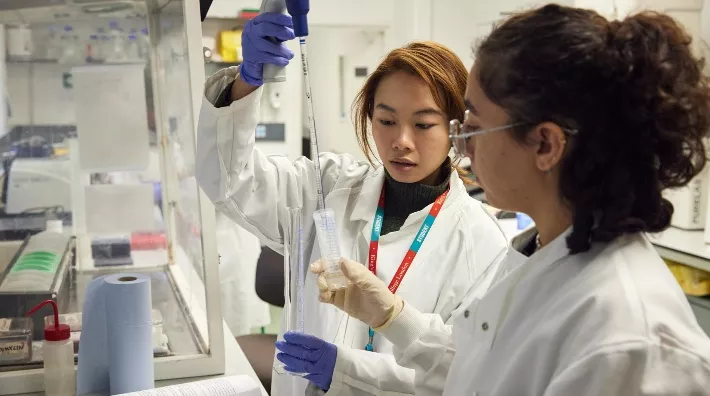
We take a look at some of the exciting diabetes research developments announced in December, and what the findings could mean for people living with or affected by diabetes.
In this month's article:
- Genetics behind type 2 diabetes in South Asian people
- New diabetic kidney disease discoveries reveal how it could be slowed
- Vitamin D doesn't protect against type 2 diabetes in healthy older people
Genetics behind type 2 diabetes in South Asian people
South Asian people often develop type 2 diabetes at a younger age and lower body weights than people of other ethnicities. Landmark new research, published in Nature Medicine, has discovered for the first time genetic factors that help explain why.
A team led by Professor Sarah Finer analysed data from nearly 60,000 British Pakistani and British Bangladeshi people in the Genes and Health study. This included nearly 12,000 individuals with type 2 and 2,000 with gestational diabetes. Their goal was to better understand how genes contribute to the development of diabetes in people of South Asian heritage, a group that historically has not been included in genetic studies of diabetes.
They found that South Asian people are more likely than White people to carry genes linked to two key issues: the body not producing enough insulin and body fat being stored in unhealthy places, like inside organs.
These genetic risks were shown to be significant drivers of gestational diabetes and of the early onset and rapid progression of type 2 diabetes in South Asian groups.
People with a high genetic predisposition for insulin and fat storage problems:
- developed type 2 diabetes on average eight years earlier and at lower bodyweights than those with a low genetic risk
- needed insulin treatment and developed complications, like retinopathy and kidney disease, at a faster rate
- responded less well to a group of type 2 diabetes medications, called SGLT2 inhibitors.
These discoveries are a vital step toward understanding why type 2 diabetes affects South Asian people differently. They also highlight the pressing need for more high-quality genetic research involving South Asian and other underrepresented groups. Previous genetic studies have focused on White European populations, holding back our understanding of diabetes in people of other ethnicities.
While the findings show the genetics are part of the story, we know cultural and social factors and access to healthcare also matter. Building a complete picture of all the reasons why South Asian communities face unique diabetes risks and challenges is essential to tailor care and tackle health inequalities.
New diabetic kidney disease discoveries reveal how it could be slowed
An international research team led by scientists from the University of Bristol has discovered new clues about how to treat diabetic kidney disease. These findings, published in Nature Communications, could pave the way for new gene and drug therapies to slow or stop kidney damage in people with diabetes.
Over time, high blood sugar levels in people with diabetes can damage blood vessels and filters in the kidneys, leading to kidney disease. They identified patterns of changes in gene activity and proteins. They then compared these changes to kidney samples from people in the early and late stages of diabetic kidney disease, to see if any were important to its progression.
They found insulin resistance is linked to several cell changes. Some were shared across all cell types, and others were unique to specific cells.
These molecular insights reveal what goes wrong inside kidneys. The hope is new drugs or gene therapies could now be developed to target these changes, to slow the progression of diabetic kidney disease.
Professor Richard Coward from the University of Bristol and Bristol Royal Hospital for Children who led the research said:
"Diabetic kidney disease is the leading cause of end-stage kidney failure in the world, occurring in up to 50 per cent of individuals with diabetes. Patients with end-stage kidney disease require daily dialysis or a kidney transplant to survive. If we can find a way to prevent this, it would save and improve countless lives.
"Our aim now is to take several of these therapeutic targets forward in a pre-clinical setting, and hopefully through clinical trials."
Vitamin D doesn't protect against type 2 diabetes in healthy older people
Results from a clinical trial suggest that taking high doses of vitamin D supplements doesn't lower the risk of developing type 2 diabetes in generally healthy older adults.
Some studies have found links between low levels of vitamin D and a higher risk of developing type 2 diabetes. But to understand whether vitamin D could offer a new strategy to help prevent type 2 diabetes, we need evidence from large and long-running clinical trials.
The Finnish Vitamin D Trial (FIND) involved 2,271 adults aged 60 or older who were considered 'generally healthy'. For example, they didn't have a heart condition, cancer, or take diabetes medications, and had enough vitamin D for good bone health.
Participants were divided into three groups:
- a group which took a placebo
- a moderate vitamin D dose group (1600 IU/day)
- a high vitamin D dose group (3200 IU/day).
The researchers tracked who developed type 2 diabetes over five years.
They found that taking vitamin D supplements, of either dose, didn't reduce chances of developing type 2 diabetes, compared to a placebo. Around 5% of participants developed type 2 diabetes in each group.
This study tells us that taking higher doses of vitamin D supplements doesn't seem to offer any added protection against type 2 diabetes in older healthy people who aren't vitamin D deficient.
Because the participants in the study were older and White men and women with sufficient vitamin D levels, we don't know if we'd see the same results in people from other ethnic groups, or those with lower vitamin D levels.
The full results were published in Diabetologia.
